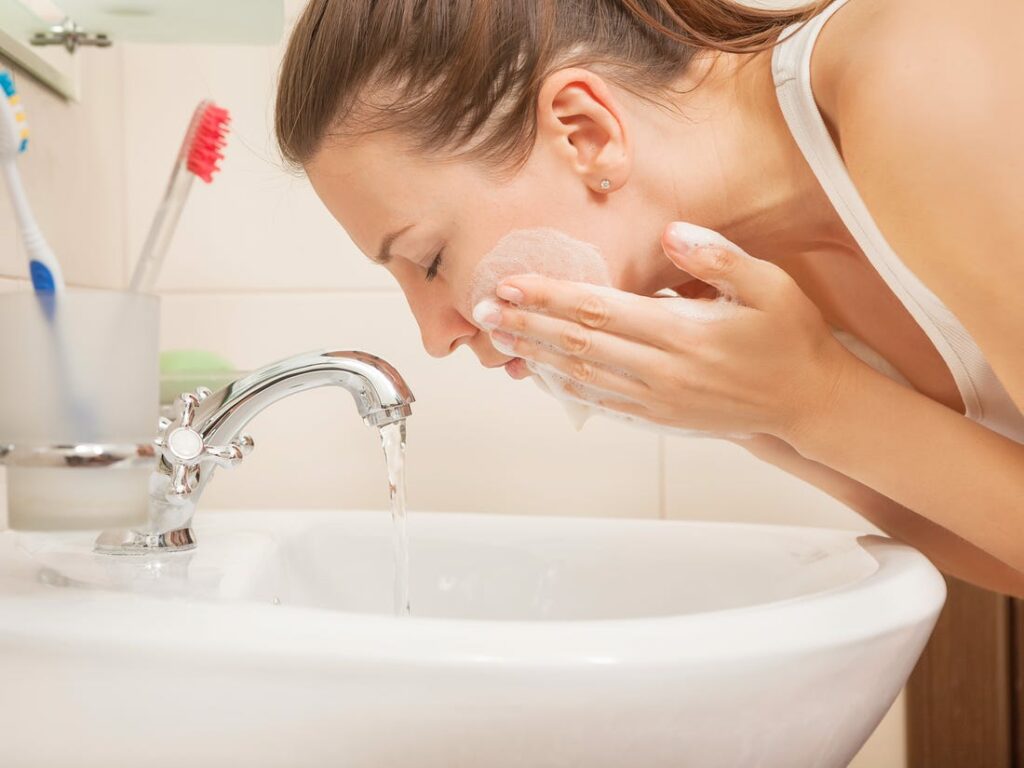The winter months are not just about battling and avoiding the dreaded cold and flu; the cold weather can also wreak havoc with our skin. Cold, wet and frosty weather classically causes dry, chapped skin and lips even in people with normally healthy skin. For those of us who suffer with chronic skin conditions like eczema, acne and psoriasis, the winter months can also result in flare-ups in these conditions. People with sensitive skin and allergies may also find their skin is more irritated in the cold weather.
Whether you have an underlying skin condition or not, here are some top tips for keeping your skin healthy during the winter months.
Cleanse

It’s a classic for a reason. Dramatic temperature change from the cold outdoors, to super cosy central heating can dry out the skin and then cause excessive oil production to compensate. Exposure to environmental pollution, especially when commuting on public transport, can leave a residue of pollutants on the skin. It’s essential to gently but thoroughly cleanse to remove dead skin cells, regulate oil production and remove the general grime of the day! This will help to prevent break-outs, whilst avoiding over-drying the skin.
Protect
Whatever your skin type is, it’s vital to moisturise and this is even more important in the winter. Invest in a good serum tailored to the individual needs of your skin. The particles are small enough to penetrate the skin surface to reach the deeper layers where they are needed to work their magic. Once you have cleansed and applied your serum then reach for your moisturiser.
Children’s Skincare
If you or your children suffer with eczema then it’s so important to moisturise. Use a rich emollient cream after bathing at least twice per day. Keep a small tube in your handbag and apply whenever your skin feels dry or tight. There are great formulations available for children too. Don’t wait for their skin to flare up to start applying it. Prevention is always better than cure especially in children.
Get them involved so they enjoy the “treat of face creams” before their skin becomes cracked and painful. If their eczema does flare up, their skin is easily irritated and it can become drama to apply these products, and in the worst case, lasting memories maybe formed, leading to future challenging and avoidance behaviour related to their skin can develop. Start them early on skincare is the message! Other good tips are to use emollient creams to wash your child with too. When you add water to water based emollient creams, like aqueous cream, or dermol, they turn into a lovely foaming, creamy wash which is so gentle making it perfect to safely and effectively cleanse your child’s sensitive skin, and yours too infact!
Stay Hydrated
It’s just as important to keep your fluids up during the winter as it is in the summer. Two litres per day easily does the job. It keeps your skin hydrated from the inside out.
Feed Your Face
Vitamins & minerals derived from a healthy balanced diet will nourish your skin from the inside out. Foods packed with anti-oxidants help to maintain skin health and also have anti-ageing properties. Blueberries, strawberries, blackberries, oranges, prunes and dark chocolate are excellent sources of anti-oxidant rich nutrients. Foods containing nutrients with anti-inflammatory properties are essential for anyone who sufferers with chronic skin conditions such as eczema, acne and psoriasis. All of these skin conditions are driven by inflammation so eating foods that help counteract this process is a great place to start.
The best anti-inflammatory foods are; tomatoes, green leafy vegetables, nuts, oily fish and olive oil. The king of anti-inflammatory foods goes to turmeric. Add this spice to liven dishes, soups and juices over the winter months to boost your intake.
Final note…
If your skin or your families skin is suffering over the winter months, please don’t suffer in silence. Your GP would be happy to offer advice; it’s so much easier to prevent skin conditions than try to reverse flare-ups!
Dr Jane Leonard is a fully qualified GP and Cosmetic doctor, graduating from the University of Manchester. She also has a first class honours degree in anatomical sciences, in which she focused her studies on the anatomy of the face, head and neck.
She completed her aesthetic training on Harley Street following a stint at The Alfred Hospital Medical Research Centre, in Melbourne, Australia. Her work in Dermatology research has been published in the prestigious Australasian Journal of Dermatology.
Almost a decade of aesthetic treatment experience, Dr Leonard has been nominated for the Cosmetic Doctor of the Year in the prestigious Safety in Beauty Diamond Awards.